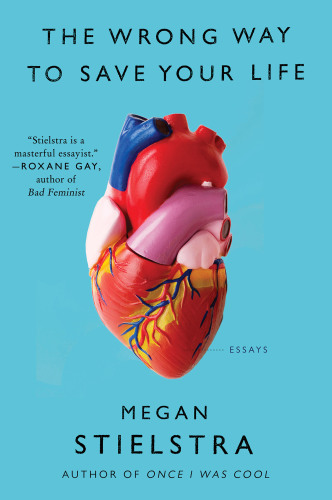
The Wrong Way to Save Your Life
Essays
کتاب های مرتبط
- اطلاعات
- نقد و بررسی
- دیدگاه کاربران
نقد و بررسی

May 15, 2017
Stielstra (Once I Was Cool) is an affable narrator in this sensitive and funny, if familiar, collection of personal essays. Perhaps best known for “Channel B,” a selection for the Best American Essays 2013 about struggling with postpartum depression, she returns with a book dedicated to a motley collection of topics, including aging, sex, race, writing, and her hometown of Chicago. Many of her essays focus on her roles as a writer and a mother, examining the joys and rigors of both. The title essay is a tender account of surviving a fire that ravaged Stielstra’s home. She has a flair for nostalgia and for cultural criticism that is never pretentious. Moreover, her take on going from her hapless 20s to her more sophisticated 40s is funny and smart. It is easy to connect with her experiences as she unabashedly relates embarrassing or discomfiting moments, whether it is digging through the trash for her retainer at Wendy’s as a teenager or sleeping with a guy during her 30s “who made me keep my socks on. He was afraid of feet.” This collection breaks no new ground, but it is a pleasant and brisk read. Agent: Meredith Kaffel Simonoff, DeFiore and Company.

Starred review from June 1, 2017
Perhaps not lifesaving, but a life-enriching collection of essays by a conscientious writer and teacher who knows that asking the right questions is more important than having all the answers.Stielstra (Once I Was Cool, 2014) has often performed her pieces as well as published them, and her strong sense of voice and engagement with her audience reflect that experience. She is an ardent feminist, but her pieces rarely seem exclusionary; they are not directed toward any particular gender, race, economic class, generation (though rites of passage in 21st-century bohemian Chicago figure heavily), or even political persuasion. The author wants people to communicate, to connect, and to face their fears, not only of each other, but the ones deep inside. When she was in the process of losing her job within the writing program at a college where she'd spent almost two decades, she writes, "I outlined a book proposal, a collection of essays about fear." That proposal became this book. So what is she afraid of? Writing. Those who might be offended by her writing. Not writing well enough. Falling in love. Getting married. Having a baby. Cancer. Men who grope. Her response to men who grope. Sex. Not enough sex. Sex with the strings of love attached. Mortgages. Property values. Her dad's heart and his hunting adventures in Alaska. Guns. When her young son asked what an essay is, she responded, "It's a kind of question." He responded, "Okay. Did you find the answer?" After having her baby, Stielstra asks, "How do you write about depression in a way that's not depressing?" Her own essay is the answer. She also maintains, "at some point, our education no longer belongs to teachers. It belongs to us." The author sounds like a marvelous teacher, and her collection offers plenty of teaching moments. In a style that is literary but never pedantic, Stielstra has crafted a collection that has such a sense of continuity that it could pass as a memoir.
COPYRIGHT(2017) Kirkus Reviews, ALL RIGHTS RESERVED.

July 1, 2017
Still shots and picture postcards created with words make up this collection of personal essays about fear. Stielstra (creative nonfiction, Northwestern Univ.; Once I Was Cool) confronts her dread and distress: overdue bills, economic declines, apartment fires, pregnancy scares, presidential elections, and writing. One episode recalls a childhood memory of catching a bucket of frogs and kissing each one, expecting a prince. Key to Stielstra's life stories is her father's instruction: "jump." Her memories range from jumping from a tree house, snarling weenie dogs, and, every child's dread, the lost retainer. Digressions include her interest in dissecting animal hearts and numerous stories about her sexual adventures. The struggle with postpartum depression and the emotional strength of a loving husband are additional themes. Stielstra is also a longtime company member of 2nd Story in Chicago, a collective of story-makers and -lovers working together to build community through the power of storytelling. Kudos to Stielstra for making her fears public and acknowledging that she may misremember. VERDICT Readers are welcome to exult or sneer at Stielstra's behavior; she appears to be okay with either.--Joyce Sparrow, Kenneth City, FL
Copyright 2017 Library Journal, LLC Used with permission.

Starred review from August 1, 2017
There may be a wrong way to save your life, but there is no wrong way to appreciate this book. As a memoir? Yes: ambivalent pregnancy tests in Italian youth hostels, wistful star-gazing on a Michigan lake. As a treatise on twenty-first-century feminism? Of course: contemplating privilege as a white woman wary of criticism and irrelevance. As a probing series of essays on fear, motherhood, career, and relationships? Without a doubt. Stielstra brings all her selves to the table and in doing so provides a crystalline haven of acceptance and safety to anyonewife, mother, educator, lover, writerwho is both present in every moment and wondering how she arrived at any particular juncture in time. Stielstra has both questions and answers. Is my writing good enough? Am I loving and loved, loyal and worthy? The answers have been amassed over the years, but more questions crop up for every one that's resolved. For its wisdom and compassion, honesty and courage, Stielstra's stellar essay collection is a lifeline and a microscope, a means of examining the dread of whatever one finds daunting and a manner of exorcising demons through the sheer power of commitment and desire.(Reprinted with permission of Booklist, copyright 2017, American Library Association.)

























دیدگاه کاربران